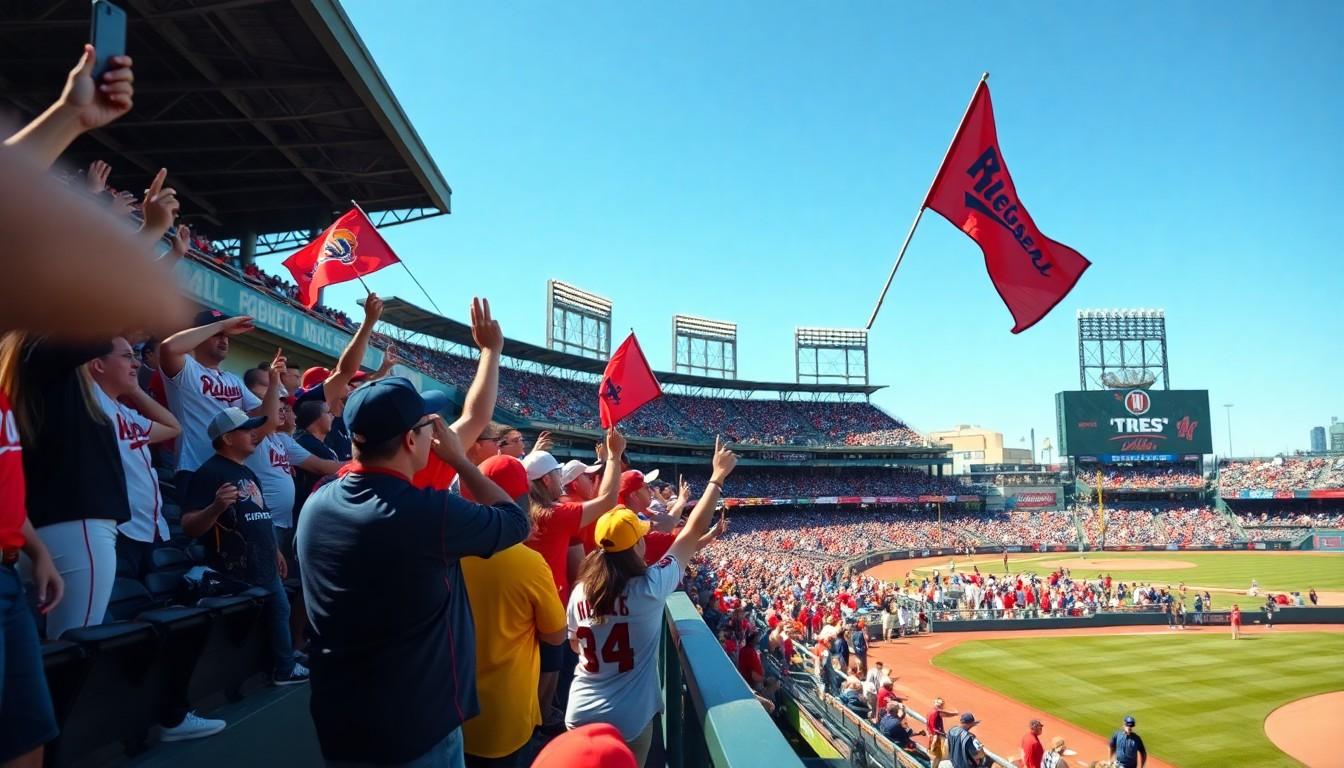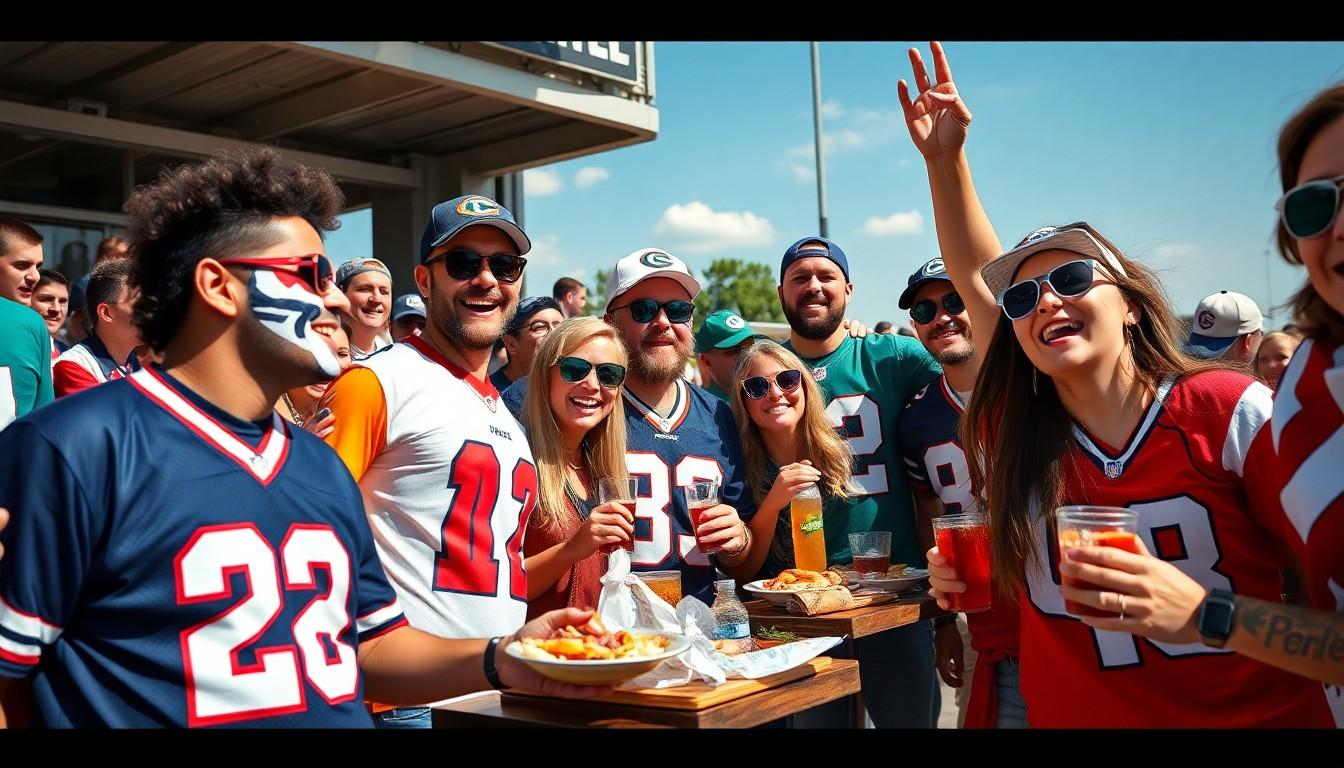Sports culture isn’t just about the game; it’s a vibrant tapestry woven from passion, camaraderie, and a sprinkle of friendly rivalry. From tailgating before the big match to the electric atmosphere in the stadium, it transforms ordinary folks into die-hard fans. Whether it’s a local high school team or a legendary professional franchise, the thrill of competition unites people like nothing else.
But let’s be honest: sports culture also comes with its quirks. Who hasn’t seen a grown adult paint their face in team colors or passionately debate the merits of a player’s latest performance? It’s a world where loyalty runs deep, and the stakes can feel sky-high—especially when it comes to fantasy leagues. Dive into the fascinating world of sports culture, where every cheer, groan, and high-five tells a story worth exploring.
Sports Culture
Sports culture encompasses a range of elements that shape the experiences of athletes and fans alike. Passion often fuels the connection among individuals, fostering a sense of belonging within communities. Loyalty to local teams or major franchises becomes a badge of honor, uniting people in celebration and support.
Rivalries play a significant role in enhancing the excitement of sports events. Friendly competitions between teams generate spirited discussions and memorable moments. Unique traditions emerge, such as tailgating at games or creating elaborate displays in support of teams.
Fans express their devotion through various means, including wearing team colors, crafting custom merchandise, and participating in social media discussions. Engagement in events, whether at stadiums or in homes, reflects a commitment that transcends the initial act of watching a game.
Cultural phenomena surrounding sports extend beyond competitions. Music, art, and literature often draw inspiration from athletic achievements. Iconic phrases and moments are embedded in popular culture, illustrating the impact of sports on society.
Diversity enriches sports culture, as individuals from different backgrounds come together. Various sports represent unique traditions around the globe, allowing for an exchange of stories and values. Understanding the significance of sports culture involves recognizing its ability to influence social interactions and community development.
By examining the intricate aspects of sports culture, one appreciates how it intertwines with daily life and fosters a collective identity among fans and players. The emotional connections cultivated through shared experiences form the bedrock of this vibrant world.
Historical Context

Sports culture has roots that trace back thousands of years, influencing societies and shaping community identities. By exploring its evolution and key milestones, one uncovers the rich tapestry woven through history.
Evolution Of Sports
Sports began as ancient rituals and games, serving both entertainment and social cohesion. In ancient Greece, the Olympic Games highlighted athletic prowess and fostered regional pride. Over centuries, various cultures embraced unique sports, such as cricket in England and baseball in America, which reflected societal values and community spirit. The industrial revolution further transformed sports, introducing organized leagues and structured competitions that elevated athletes to celebrity status. Today, globalization amplifies the reach of sports, connecting diverse communities and creating a shared passion, enhancing the overall experience.
Key Milestones In Sports Culture
Significant milestones have shaped sports culture over time. The establishment of modern Olympiads in 1896 marked the revival of international competition, promoting global unity. Professional leagues, including Major League Baseball and the National Football League, established in the early 20th century, generated dedicated fan bases and commercial growth. The 1960s civil rights movements brought attention to athlete activism, linking sports with social change. More recently, the advent of digital media revolutionized fan engagement, allowing real-time interaction and broader access to events. Each milestone contributes to the vibrant sports culture, fostering connections among fans, athletes, and communities worldwide.
Impact Of Sports Culture
Sports culture significantly influences various aspects of society. It cultivates community, shapes identities, and inspires individuals from diverse backgrounds.
Social Influence
Sports culture fosters social connections among fans and athletes. It creates environments where communities come together to support teams, building camaraderie and shared experiences. Fans bond over games, exchanging stories and forming friendships that bridge generations. Events like tailgates and watch parties enhance these social interactions, allowing fans to connect beyond the sport itself. Additionally, sports figureheads often serve as role models, influencing values such as teamwork, perseverance, and sportsmanship in younger generations. This shared enthusiasm deepens social ties and instills a sense of belonging, where loyalty to teams reinforces community identity.
Economic Contributions
The economic impact of sports culture extends far and wide. Although sometimes overlooked, it generates billions in revenue through ticket sales, merchandise, and broadcasting rights. This financial influx supports local economies, creating jobs in hospitality, retail, and event management. Sports events also attract tourism, with major competitions drawing visitors who contribute to the economy. Furthermore, sponsoring businesses benefit from increased visibility and customer engagement. Athlete endorsements play a significant role, with athletes transforming into influencers for brands, boosting sales across various industries. This interaction between sports culture and economics reinforces its importance in both civic pride and financial stability.
Regional Variations In Sports Culture
Sports culture varies significantly across the globe, influenced by regional traditions, history, and social dynamics.
North American Sports Culture
In North America, diverse sports dominate, with American football and basketball leading in popularity. Fans demonstrate their enthusiasm through elaborate tailgating parties and vibrant game-day traditions. Major League Baseball has a storied history, unique stadium experiences, and passionate local rivalries that engage communities. Professional leagues attract millions, with events like the Super Bowl generating significant media attention. This culture connects individuals through shared experiences and loyalty to teams, shaping identities and fostering camaraderie among fans.
European Sports Culture
European sports culture reflects a deep passion for soccer, known as football in many regions. Stadiums become electric during matches, with fans showcasing loyalty through chants and flags. Rivalries often transcend geographic borders, creating intense atmospheres in competitions like the UEFA Champions League. Other sports, such as rugby and cricket, also hold significant cultural importance, with festivals and regional tournaments reinforcing community bonds. This culture emphasizes heritage, embodying historical narratives and national pride.
Asian Sports Culture
Asia boasts a rich tapestry of sports traditions, with cricket, football, and basketball having strong followings. In many countries, local festivals and events revolve around sports, celebrating athletes and cultural legacies. E-sports have gained considerable traction, merging technology and gaming with traditional sports fandom. National teams often cultivate intense pride during international competitions, showcasing resilience and talent. The diversity of sports represents a blend of modernity and tradition, contributing to social cohesion across the region.
Challenges Facing Sports Culture
Sports culture faces several significant challenges, impacting its vibrancy and relevance. These challenges often stem from broader societal trends and economic forces.
Commercialization
Commercialization affects the authenticity of sports culture. Increased focus on profit can overshadow the fundamental values of sportsmanship and community. Many fans express concern about ticket prices and access to games, which can deter participation. Major corporations often prioritize profitability over fan engagement, diluting the unique experiences associated with live events. The proliferation of sponsorships transforms classic rivalries into marketing opportunities, altering the emotional connection fans feel towards teams. Athletes also face pressure to align with brands, sometimes compromising their true identities.
Inclusivity And Diversity
Inclusivity and diversity represent ongoing challenges within sports culture. Barriers still exist, preventing certain groups from fully enjoying or participating in sporting activities. Cultural differences may not always be celebrated, leading to feelings of alienation among fans. Initiatives aimed at promoting diversity must gain traction to enhance representation, especially among women and underrepresented communities. Organizations increasingly recognize the importance of accessibility in sports, yet implementation varies widely. Creating environments that welcome everyone requires concerted efforts at all levels, from grassroots programs to major leagues.
Future Of Sports Culture
The future of sports culture is poised for transformation. Emerging trends and innovations will reshape fan experiences and athlete engagement.
Trends To Watch
Increased emphasis on inclusivity will feature prominently. More organizations will prioritize initiatives fostering participation among underrepresented groups. Growth in women’s sports is evident with expanded media coverage and investment. Additionally, localized experiences in sports fandom will thrive, as teams engage with communities through events and outreach. Shifts towards sustainability will lead to eco-friendly practices in venues and merchandise. Virtual reality and enhanced viewing experiences will also gain traction, providing fans with immersive ways to connect with their favorite sports. Moreover, the rise of athlete activism will continue to challenge social norms, as more athletes advocate for critical issues.
The Role Of Technology
Technology plays a critical role in shaping sports culture. Advancements in streaming platforms drastically change how fans consume content. Access to live games via mobile devices facilitates engagement from anywhere. Social media continues to be a vital channel, enabling real-time conversations between fans and athletes. Wearable devices contribute to athlete performance tracking, informing training regimes and enhancing competition. Virtual and augmented reality experiences will create unparalleled engagement opportunities, allowing fans to experience games like never before. Blockchain technology may revolutionize ticket sales and merchandise, ensuring transparency and security. As technology evolves, its integration into sports culture will only intensify, creating exciting paths forward for fans and athletes alike.
Sports culture is a dynamic force that shapes identities and fosters community. It transcends the games themselves, creating bonds among fans and athletes alike. As it evolves, the integration of technology and a focus on inclusivity promise to enrich the experience for everyone involved.
While challenges like commercialization and accessibility persist, the passion and dedication of fans and players continue to drive this vibrant culture forward. The future holds exciting possibilities as sports culture adapts to emerging trends, ensuring it remains a vital part of society.

